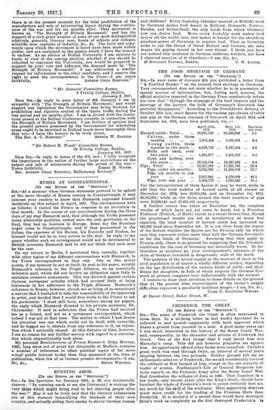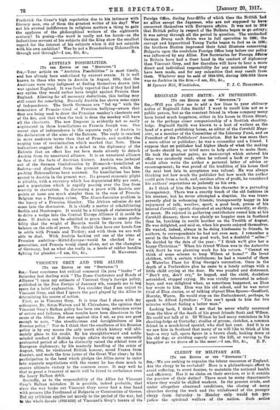FREDERICK THE GREAT.
[To THE EDITOR OF THE " SPECTATOR."]
Sie,—The name of Frederick the Great is often mentioned in these days. In a striking letter in last week's Spectator he is referred to and quoted—apparently with tacit approval which draws a protest from yourself in a note. A good many years ago I was much interested in the history of the Seven Years' War. and, consequently, in the character and actions of Frederick the Great. One of the first things that I read about him was Macaulay's essay. This• did not however prejudice me against him. As opportunity offered other books were consulted. Carlyle's great work was read through twice, an interval of several years elapsing between the two perusals. Neither perusal left me an enthusiastic admirer of Frederick; the second considerably lowered the estimate at first formed of him, except in the one capacity of leader of armies. Fonblanque's Life of General Burgoyne con- tains reports on the Prussian Army after the Seven Years' War that foreshadow the collapse of Jena in 1806. That Napoleon in a few weeks, only twenty years after the King's death, should have knocked the whole of Frederick's work to pieces certainly does not say much for the skill of the workman. Stein apparently deserves much more credit for the binding of the Prussian State than Frederick. It is doubtful if a second Jena would have destroyed Stein's work as completely as the first destroyed Frederick's. Is
Frederick the Great's high reputation due to his intimacy with literary men, one of them the greatest writer of his day? Was not his avowed indifference in religions matters a thing to gain the applause of the philosophical writers of the eighteenth century? In posing—the word is really not too harsh—as the industrious servant of his subjects did the King show the smallest regard for the interest of his subjects when it did not coincide with his own ambition? Was he not a Brandenburg Hohenzollern through and through?—I am, Sir, dc., B.



































 Previous page
Previous page